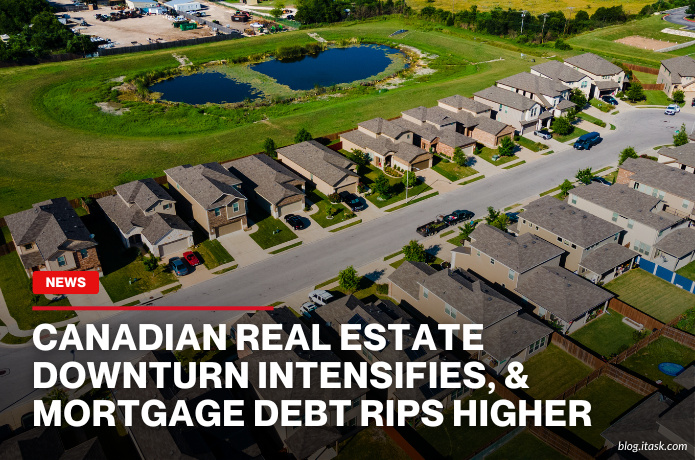Canadian Real Estate Downturn Intensifies, & Mortgage Debt Rips Higher
Canadian Real Estate Downturn Intensifies, & Mortgage Debt Rips Higher

Canadian real estate prices continue to slide, with the benchmark home price falling another 0.7 % in April—dropping around \$4,800 to \$701,900. That leaves the price roughly 3.6 % lower than it was a year ago. Since the peak in early 2022, average home values have fallen by nearly 17 %, and buyers keep rejecting higher prices even at lower points, showing strong downward pressure on the market.
Prices reached a four-year low in May, when the same benchmark dropped further to about \$690,900, marking the cheapest level since mid-2021. This fifth and sixth month of declines reflect soft demand, rising inventory, and continued economic uncertainty across regions.
Despite falling prices and weak resale activity, Canadian households are borrowing more than ever. In February, total household debt rose by 0.2 %—an extra \$6.2 billion—reaching a staggering \$3.04 trillion. That is nearly double the growth rate seen in 2019, before the pandemic accelerated borrowing. The bulk of that increase—around 84 %—came from new or refinanced mortgages, even as resale volumes drop.
Mortgage obligations now account for about 106 % of Canada’s GDP, far higher than other developed countries. While consumer credit is growing slowly, mortgage debt is expanding steadily. That suggests many households are leveraging equity or buying new construction, rather than trading in existing homes.
Financial regulators warn of rising risk from so many mortgages needing renewal at higher interest rates. As much as 76 % of outstanding mortgages are due for renewal by the end of 2026. Many borrowers could face “payment shock” if their new rates are significantly higher than what they signed up for years ago, raising the risk of arrears and defaults.
Meanwhile, delayed rate cuts and economic weakness are putting strain on household finances. Missed mortgage payments rose sharply in major cities last year, while credit card and auto debt delinquencies also climbed. Regulators expect these trends to continue unless the real estate downturn deepens and prices correct further.
